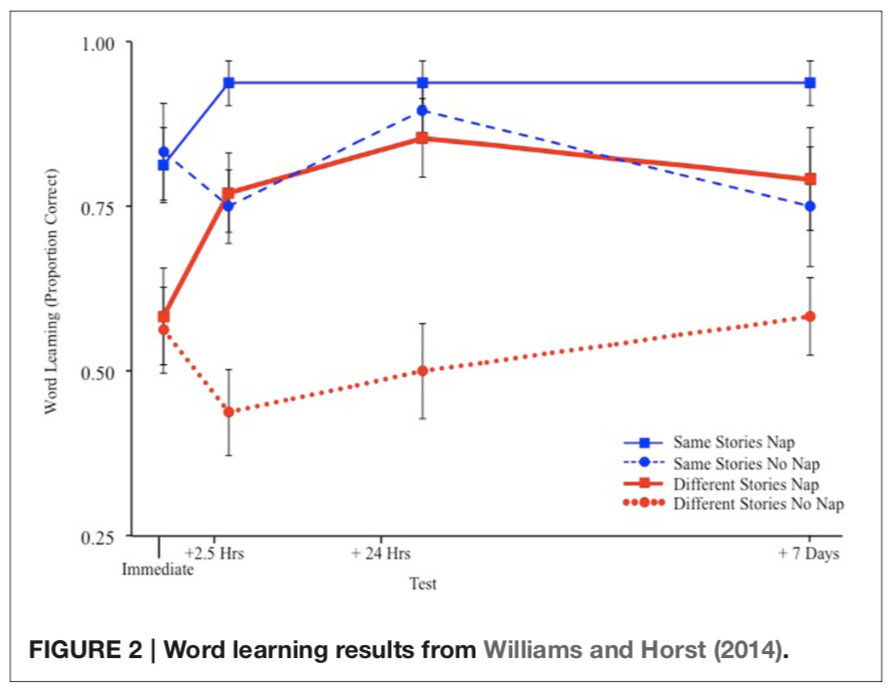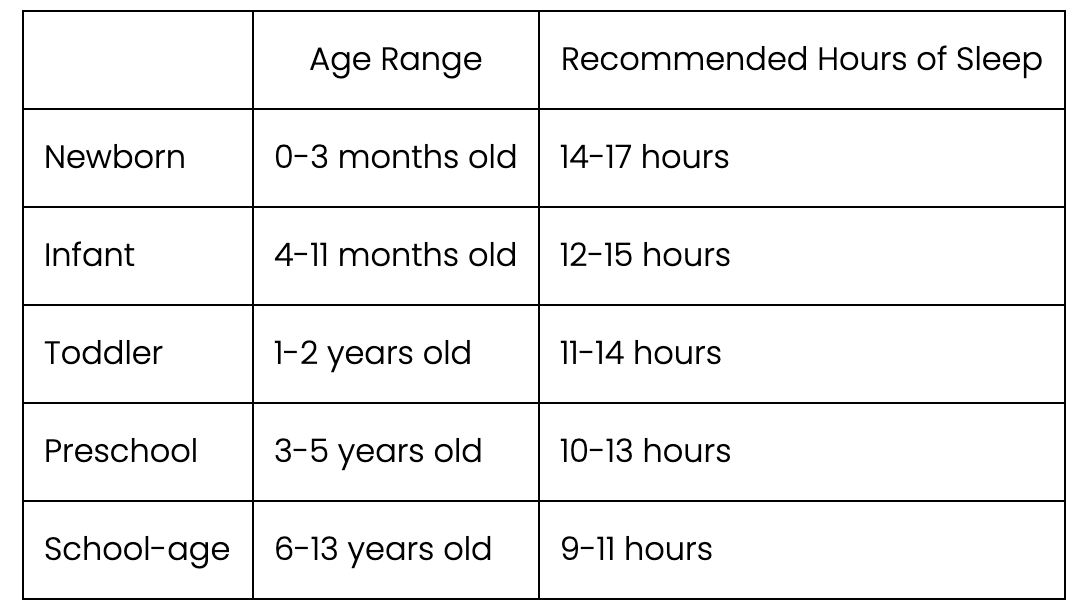By Ana Paula Yin and Shiyun Wang
This is a summary of: Axelsson, E. L., Williams, S. E., & Horst, J. S. (2016). The effect of sleep on children’s word retention and generalization. Frontiers in Psychology, 7. doi:10.3389/fpsyg.2016.01192
The Conventional Wisdom
As a kid, have you ever wondered why we were encouraged to nap in between activities in preschool or why we couldn’t use assigned nap times to do more activities? In fact, wouldn’t we learn more if we designated nap time to activities? According to the National Sleep Foundation, I’m afraid that might not be the case; sleep is just as important as feeding and hygiene to children. Conventional wisdom says that “sleep is the golden chain” and that “it binds health and our bodies together.” It is not by chance that a significant part of conventional wisdom supports the promotion of healthy behaviors. A substantial portion of them is related to sleep, acknowledging its importance for our universal well-being.
Why Do We Even Sleep?
Nevertheless, why do we even sleep? Sleep is related to the brain’s healthy development and functioning (Dahl, 1999; Siegel, 2005; Hill et al., 2007; Galland et al., 2012). Moreover, sleep aids children with significant benefits (Touchette et al., 2007; Fondell et al., 2011; Jansen et al., 2011). Studies have revealed that sleep enormously enhances language acquisition during early development.
Study on Napping
A study by Williams and Horst (2014) illustrates that children of age 3 recall more words read to them from storybooks if they nap soon after being introduced to the terms than if they do not rest. Researchers presented the same stories and different stories to test the implications of sleep on children’s facility to hold onto new words. Some children had the same stories read to them three times, while others had three different stories. Both conditions received the same amount of exposure to the selected words throughout the reading phase. Exposure to different stories is a case where learning becomes more complicated than exposure to the same story repeatedly (Horst et al., 2011). As seen in the figure below, the presentation of words right before children’s nap time was especially beneficial for children exposed to the new terms that came from different stories compared to words that came from the same stories. The findings demonstrate that taking a nap shortly after reading permitted children who encountered this obstacle of being exposed to different stories to succeed just as well as peers who stayed awake and heard the same stories. Furthermore, the advantage of napping shortly after was prolonged for seven days after listening to the words. As such, sleeping right after exposure to novel information improves memory (Talamini et al., 2008; Payne et al., 2012).
Other researchers have shown that sleep deprivation disturbs the parts of the brain associated with executive functions, such as tasks assessing attention, memory, and alertness (Goel et al., 2009). Less than an hour restriction in children’s sleep for three days was enough to display worse executive function performance (Raviv et al., 2003). Considering that, sleep deprivation can impair the capability to absorb novel information (Axelsson, Williams, & Horst, 2016). Most importantly, since word learning is a gradual process that takes place progressively (McMurray et al., 2012; Bion et al., 2013), regular naps pose important ramifications for the retention of novel words in the long term.
But, Why is Sleep so Important for Children’s Word Retention?
First, what is word retention? Word retention is one’s potential to identify and accurately signal a word that has already been seen in a context different from the context where the term was initially heard (Axelsson, Williams, & Horst, 2016). Now, what could account for the consolidation of novel information during sleep? Researchers have approached this using the Active System Consolidation Theory (ASC), which implies that during sleep, memories become activated to be consolidated (Born & Wilhelm, 2011). According to the ASC theory, sleep is considered an active state (Dement and Kleitman, 1957). During sleep, memory-related to novel words are replayed in the brain, allowing biological events to transfer newly encountered information into long-term memory (Axelsson, Williams, & Horst, 2016). Sleep benefits children’s retention of new words by facilitating word-related memory consolidation.
Advice for Parents and Teachers:
The studies on the effect of napping in word retention pose a responsibility for preschools to place naps during school hours. Concerns have been raised that preschools lower nap times and increase curriculum instruction (Kurdziel et al., 2013; Mednick, 2013). It is crucial to address these studies’ findings to health professionals, educational policymakers, and parents (Staton et al., 2016). With that in mind, guaranteeing that children are supported by an organized schedule consisting of naps and sleep suited to their age is crucial. An organized program avoids implications on novel word retention and their efficiency to function in new educational settings.
Recommendations for total daily sleep by age, by the National Sleep Foundation
References
Axelsson, E. L., Williams, S. E., & Horst, J. S. (2016). The effect of sleep on children’s word retention and generalization. Frontiers in Psychology, 7. doi:10.3389/fpsyg.2016.01192
Bion, R. A. H., Borovsky, A., and Fernald, A. (2013). Referent selection and word learning in 18- and 24-month-old infants. Cognition 126, 39–53. doi: 10.1016/j.cognition.2012.08.008
Dahl, R. E. (1999). The consequences of insufficient sleep for adolescents: links between sleep and emotional regulation. Phi. Delta Kappan 80:354.
Diekelmann, S., and Born, J. (2010). The memory function of sleep. Nat. Rev. Neurosci. 11, 114–126. doi: 10.1038/nrn2762
Dement, W., and Kleitman, N. (1957). Cyclic variations in EEG during sleep and their relation to eye movements, body motility, and dreaming. Electroencephalogr. Clin. Neurophysiol. 9, 673–690. doi: 10.1037/h0 048189
Galland, B. C., Taylor, B. J., Elder, D. E., and Herbison, P. (2012). Normal sleep patterns in infants and children: a systematic review of observational studies. Sleep Med. Rev. 16, 213–222. doi: 10.1016/j.smrv.2011.06.001
Goel, N., Rao, H., Dumer, J. S., and Dinges, D. F. (2009). Neurocognitive consequences of sleep deprivation. Semin. Neurol. 29, 320–339. doi: 10.1055/s- 0029-1237117
Hill, C. M., Hogan, A. M., and Karmiloff-Smith, A. (2007). To sleep, perchance to enrich learning? Arch. Dis. Child 92, 637–643. doi: 10.1136/adc.2006.096156
Horst, J. S., Parsons, K. L., and Bryan, N. M. (2011). Get the story straight: contextual repetition promotes word learning from storybooks. Front. Psychol. 2:17. doi: 10.3389/fpsyg.2011.00017
Jansen, P. W., Saridjan, N. S., Hofman, A., Jaddoe, V. W., Verhulst, F. C., and Tiemeier, H. (2011). Does disturbed sleeping precede symptoms of anxiety or depression in toddlers? The generation R study. Psychosom. Med. 73, 242–249. doi: 10.1097/PSY.0b013e318 20a4abb
Fondell, E., Axelsson, J., Franck, K., Ploner, A., Lekander, M., Bälter, K., et al. (2011). Short natural sleep is associated with higher T cell and lower NK cell activities. Brain Behav. Immun. 25, 1367–1375. doi: 10.1016/j.bbi.2011. 04.004
Kurdziel, L., Duclos, K., and Spencer, R. M. C. (2013). Sleep spindles in midday naps enhance learning in preschool children. Proc. Natl. Acad. Sci. U.S.A. 110, 17267–17262. doi: 10.1073/pnas.1306418110
McMurray, B., Horst, J. S., and Samuelson, L. K. (2012). Word learning as the interaction of online referent selection and slow associative learning. Psychol. Rev. 119, 831–877. doi: 10.1037/a0029872
Mednick, S. C. (2013). Napping helps preschoolers learn. Proc. Natl. Acad. Sci. U.S.A. 110, 17171–17172. doi: 10.1073/pnas.1316489110
Payne, J. D., Tucker, M. A., Ellenbogen, J. M., Wamsley, E. J., Walker, M. P., Schacter, D. L., et al. (2012). Memory for semantically related and unrelated declarative information: the benefit of sleep, the cost of wake. PLoS ONE 7:e33079. doi: 10.1371/journal.pone.0033079
Sadeh, A., Gruber, R., and Raviv, A. (2003). The effects of sleep restriction and extension on school−age children: what a difference an hour makes. Child Dev. 74, 444–455. doi: 10.1111/1467-8624.7402008
Siegel, J. M. (2005). Clues to the functions of mammalian sleep. Nature 437, 1264–1271. doi: 10.1038/nature04285
Suni, E. (2020, September 24). How much sleep do babies and kids need? Retrieved March 06, 2021, from https://www.sleepfoundation.org/children-and-sleep/how-much-sleep-do-kids-need
Staton, S., Marriott, A., Pattinson, C., Smith, S., Sinclair, D., and Thorpe, K. (2016). Supporting sleep in early care and education: an assessment of observed sleep times using a sleep practices optimality index. Sleep Health 2, 30–34. doi: 10.1016/j.sleh.2015.12.005
Talamini, L. M., Nieuwenhuis, I. L., Takashima, A., and Jensen, O. (2008). Sleep directly following learning benefits consolidation of spatial associative memory. Learn. Mem. 15, 233–237. doi: 10.1101/lm.771608
Touchette, É., Petit, D., Séguin, J. R., Boivin, M., Tremblay, R. E., and Montplaisir, J. Y. (2007). Associations between sleep duration patterns and behavioral/cognitive functioning at school entry. Sleep 30, 1213–1219. Available online at: http://www.journalsleep.org/ViewAbstract.aspx?pid=26943
Williams, S. E., and Horst, J. S. (2014). Goodnight book: the benefit of sleep consolidation on word learning via storybooks. Front. Psychol. 5:184. doi: 10.3389/fpsyg.2014.00184

